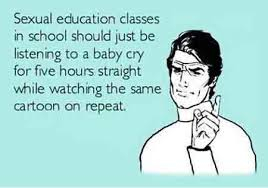In this society, we treat sex like the Big Cheat. You know, when you go on a diet and you can’t have this food or that food or any other food you’d really like to have, so … you substitute. It doesn’t hit your spot, you’re still hungry, and you’re still craving what you didn’t allow yourself to have. So you binge. It’s at once the prurient attraction and the guilt-laden violation.
 But money? Well, we treat that like it’s too sacred to be spoken of in detail and with clarity.
But money? Well, we treat that like it’s too sacred to be spoken of in detail and with clarity.
We teach sex ed in elementary and high school, but not money, not economics, not basic life/housekeeping crap like how to balance a checkbook, what credit is and how to control it, you know–stuff that if not managed properly can pretty much ruin your life for a while and sometimes, without money, you can’t get laid or worse, you don’t want to get laid because you’re too stressed about your money.
What, is money the sacred cow?
The Thing We Don’t Talk About To Our Children?
We didn’t talk about money in my house growing up. We were kids. It wasn’t our business. It wasn’t spoken of in public. It was just … gauche and undignified. I still feel like that with regard to salaries and such—no, it’s just not cocktail party conversation fodder. On the other hand, not talking about salaries amongst coworkers/colleagues does have its disadvantages.
I learned about checking accounts and your basic bookkeeping in high school (thank heavens or I wouldn’t have had a clue!). I didn’t learn about credit/charge cards until I got in over my head and didn’t know how I’d gotten there. Or how to get out. In short, I didn’t know anything about anything.
Dude and I plan to be as upfront with the money discussions in our house as we are the sex discussions. If that means we open up our bank accounts and break down our credit obligations, we’re prepared to do it. I shudder to think of my Tax Deductions going out into the world knowing what I knew about money, which was zero, zip, nada.
So I ask again: Why aren’t basic financial principles taught in schools, but sex is?

Amen, Sister Jovan.
.
It used to be, in California at least. But then someone realized only non-college-bound kids took those courses which suggested they were inherently unfair so they axed them.
I think it would be a good required course for freshmen in lieu of health or driving or speech or geography or whatever a particular district requires of freshmen.
Also, it would probably be a good additional bit of curriculum for the economics class.
And an important part of, say, 6th-grade math.
—-
I read in the Ensign once about a family that had a monthly budget meeting and, once teenagers, the kids took over the bill-paying and like. I remember thinking it was brilliant and to be copied.
Wish I remembered when I read it…..
I think I remember reading something akin to that and having the same reaction.
The TDs are too young yet to participate, but something’s going to get initiated.
And yes, I think 6th grade is about the appropriate time.
Now, we’re still divided on the allowance issue versus chores-because-you-live-here versus chores-for-money.
.
Me too. I should really consider this so I don’t have to make a split decision I regret.
I’m nearly 30. I have an advanced degree that emphasized finance. I don’t manage money beyond the concept of “I’m carrying consumer debt. I should spend as little as reasonably possible.” Now that is no longer the case, and I have no idea what to do with the money. I should, but I don’t. All I know is: don’t waste it, but it’s okay to spend it on stuff we need, like an ironing board, vacuum, and bookcase, and perhaps even a bigger dishrack, but not on a new car, because I don’t have enough for a 2010 Buick LaCrosse. I’ve never seen a $30000 car that nice. I would like to have one. But it costs more than the aforementioned ironing board, vacuum, bookcase, and dishrack, (combined! every month! for five years!) so I can’t get it yet.
Money is more complicated than it ever has been before, and all kids will need to know how to manage it. Even well-educated people with good jobs get into trouble when they overspend or don’t have adequate emergency savings.
Amen. It’s even worse when you’re trying to build a business and have to think about what kind of return you can expect to get on that dollar going out the door, and think in the long-term.